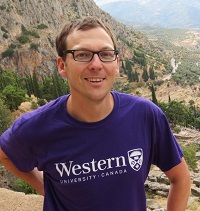

War, trauma, memory
Bernd Steinbock, historian of ancient Greece, reflects on a universal theme
How did the ancient Greeks deal with the trauma of war? What role did memory play in the processing of trauma? These and other topics were the subject of the classes that Prof. Bernd Steinbock (University of Western Ontario, Canada) held in Trento as a research fellow and visiting professor invited by CeASUm. We interviewed him for the webmagazine.
Prof. Steinbock, you are an expert on social memory. Do you think it is a useful methodological tool to study the ancient Greeks?
 Today, social or collective memory – that is a community’s shared and often idealized and distorted image of its past – is no longer seen as an unreliable counterpart of history, but rather as an invaluable key to a group’s mentality, revealing the ideological forces that hold a society together. The concept of social memory allows us to study what ancient Greeks knew about their past, what this past meant to them, and how individual speakers operated within this complex memorial framework. Judging from Greek historiography and the political speeches that have come down to us, politicians in ancient Greece frequently employed historical examples to support their arguments in the assembly, the law courts and the diplomatic arena.
Today, social or collective memory – that is a community’s shared and often idealized and distorted image of its past – is no longer seen as an unreliable counterpart of history, but rather as an invaluable key to a group’s mentality, revealing the ideological forces that hold a society together. The concept of social memory allows us to study what ancient Greeks knew about their past, what this past meant to them, and how individual speakers operated within this complex memorial framework. Judging from Greek historiography and the political speeches that have come down to us, politicians in ancient Greece frequently employed historical examples to support their arguments in the assembly, the law courts and the diplomatic arena.
Yet scholars have often dismissed such references to the past as empty rhetorical phrases or propagandistic cover-ups for Realpolitik. When studied from the perspective of social memory, such arguments from the past are revealed to be what they inevitably are, namely political capital in their own right and important factors in political decision making. By contextualizing the orators’ historical allusions within the complex net of remembrances and beliefs held by their audience, we are able to gauge their ideological and emotive power and thus gain a more nuanced understanding of the uses and meanings of the past in public discourse in ancient Greece.
In recent years, you have focused on war trauma, a sadly pressing issue. What has led you from studying social memory to the issue of trauma? Are the two issues connected? Is trauma an individual experience or can it to some extent be collective?
It was ultimately my interest in Athenian social memory that has led me to the question of trauma. Building on Maurice Halbwachs’ concept of ‘collective memory’ – the relevance of which has recently been reaffirmed by Prof. Maurizio Giangiulio from the University of Trento – most memory studies emphasize the dominant role of the present in constructing a ‘usable past’ that creates collective identity and societal cohesion. For my first monograph on social memory in Athenian public discourse, I have largely employed this Neo-Durkheimian theoretical framework. Yet our sources also feature historical allusions to catastrophic military defeats, which stand in contrast to the community’s positive self-image and – according to the maxims of the Neo-Durkheimian paradigm – should soon have faded from common historical consciousness.
Some events are simply so horrendous that the typical mechanisms of constituting and transmitting a shared image of the past do not seem to apply. As a result of this observation my research interests have shifted from purely constructivist models of collective memory to the role of traumatic memory in ancient Greece. I am particularly interested in how a Greek polis reacted to and tried to come to terms with the collective trauma of a catastrophic military defeat and in the role that such a traumatic event played in the collective memory of subsequent generations. The annihilation of the 40,000-men-strong Athenian expeditionary corps in Sicily in 413 BC seems like an ideal candidate for such a case study.
But how can we meaningfully speak of a ‘collective trauma’? For my investigation I consider the sociopsychological concept of ‘social trauma’ the methodologically most robust, since it grounds social trauma in the trauma of individuals but at the same time considers the many ways trauma is socially mediated. It can thus account for the transmission of trauma between people and even across generations and considers social trauma an integral part of a community’s social or collective memory.
How have trauma issues entered the field of ancient history? And which are the main theoretical and methodological challenges of detecting trauma-related aspects in the ancient Greek world?
In 1976 John Keegan revolutionized the study of military history by shifting the focus from the general’s perspective to the experience of the common soldiers fighting the battles. Keegan’s Face of Battle approach was soon also applied to ancient Greek warfare, and scholars set out to reconstruct what it must have been like to fight in a typical hoplite battle. It is not surprising, that in the vein of this new, more empathetic approach to ancient Greek warfare, the psychological costs of war eventually also became an object of study. In 1994, Jonathan Shay, a clinical psychiatrist treating Vietnam veterans with severe post-traumatic stress disorder (PTSD), argued for the timeless nature of war-induced psychological trauma by pointing to the depiction of war and its devastating psychological effects in Homer’s Iliad, which depicts behaviors familiar to Shay from the accounts of his patients.
Inspired by Shay’s work, ancient historians have tried to identify potential cases of war-related PTSD in ancient Greece by drawing on incidental depictions of soldiers’ mental conditions in Greek historiography, votive inscriptions and other literary sources. Yet such attempts have often been met with considerable scepticism by scholars who consider trauma a purely modern phenomenon and regard its application to the ancient world as anachronistic. This criticism has overall had a salutary effect since it encouraged scholars of historical post-war trauma to refine their theoretical models.
One way forward is to acknowledge that while trauma itself is a universal phenomenon, the occurrence of war-induced trauma is indeed dependent on culturally and historically specific factors, such as the combatants’ value system and their social and tactical environments. Taking these factors into account, one can make a good case, for instance, that the participants in the Athenians’ Sicilian Expedition in 413 BC were exposed to extreme war experiences that far exceeded the hardships of normal military campaigns, which likely resulted in psychological trauma for at least some of the survivors.
The interview was given in March 2022. In addition to workshops for students and doctoral candidates, Prof. Steinbock also gave two public lectures on the trauma following the disastrous expedition to Sicily led by the Athenians: “The Sicilian Expedition as Social Trauma for the Athenians”, “Working through Trauma: Thucydides’ Empathic Account of the Athenians’ Departure from Syracuse”. The seminar and conferences were organized by Elena Franchi as part of the activities of LabSA, one of the facilities of the Center of Advanced Studies in the Humanities - CeASUm of the Department of Humanities.
.
La guerra, il trauma, la memoria
Bernd Steinbock, storico dell’antica Grecia, riflette su un tema universale
In che modo gli antichi Greci affrontavano il trauma della guerra? Che ruolo ricopriva la memoria nell’elaborazione del trauma? Questi e altri argomenti sono stati oggetto delle lezioni tenute dal professor Bernd Steinbock (University of Western Ontario, Canada) a Trento in qualità di research fellow e visiting professor su invito del CeASUm. Lo abbiamo intervistato per il Mag.
 Professor Steinbock, lei è un esperto di memoria sociale. Ritiene che sia uno strumento metodologico utile per lo studio degli antichi Greci?
Professor Steinbock, lei è un esperto di memoria sociale. Ritiene che sia uno strumento metodologico utile per lo studio degli antichi Greci?
Oggi la memoria sociale o collettiva - ovvero l’immagine condivisa e spesso idealizzata e distorta che una comunità ha del proprio passato - non è più vista come la controparte inattendibile della storia, ma piuttosto come una preziosa chiave di accesso alla mentalità di un gruppo, capace di rivelare le forze ideologiche che tengono assieme una società. Il concetto di memoria sociale ci permette di studiare ciò che gli antichi Greci conoscevano del proprio passato, il significato che esso aveva per loro, e come singole voci intervenissero in questo complesso quadro di ricordi.
Dalla storiografia e dai discorsi politici greci che sono giunti fino a noi emerge che nella Grecia antica si ricorreva frequentemente a esempi storici a sostegno delle argomentazioni nelle assemblee, nei tribunali e nella diplomazia. Eppure gli studiosi hanno spesso respinto questi riferimenti al passato ritenendoli vuote frasi retoriche o coperture propagandistiche per mascherare la Realpolitik. Quando vengono studiati nell’ottica della memoria sociale, questi argomenti che fanno uso del passato si rivelano per quello che inevitabilmente sono, ovvero un capitale politico a pieno titolo ed elementi importanti nei processi decisionali politici. Contestualizzando i riferimenti storici degli oratori nella complessa rete dei ricordi e delle credenze del loro pubblico, riusciamo a misurarne la potenza ideologica ed emotiva e quindi ad acquisire una comprensione più raffinata degli usi e dei significati del passato nel discorso pubblico nella Grecia antica.
Negli ultimi anni i suoi studi si sono concentrati molto sul trauma di guerra, un tema tristemente attuale. Cosa l’ha portata dallo studio della memoria sociale al tema del trauma? C’è un collegamento? Il trauma è un’esperienza individuale o può in una certa misura essere collettivo?
Ciò che mi ha portato alla questione del trauma è stato soprattutto il mio interesse per la memoria sociale ateniese. Prendendo spunto dal concetto di “memoria collettiva” di Maurice Halbwachs – la cui rilevanza è stata recentemente riaffermata dal professor Maurizio Giangiulio dell’Università di Trento – la maggior parte degli studi sulla memoria evidenzia il ruolo dominante del presente nella costruzione di un “passato utile” che contribuisca a fondare l’identità collettiva e la coesione sociale. Per il mio primo libro sulla memoria sociale nel discorso pubblico ateniese ho fatto ampiamente riferimento a questo quadro teorico neo-durkheimiano. Tuttavia, le nostre fonti comprendono anche richiami storici a sconfitte militari catastrofiche, che contrastano con l’immagine positiva di sé della comunità e – in conformità con i dettami del paradigma neo-durkheimiano – avrebbero dovuto svanire presto dalla consapevolezza storica comune. Alcuni eventi sono semplicemente così orribili che i meccanismi tipici di costruzione e trasmissione di un’immagine condivisa del passato risultano inapplicabili.
A seguito di queste riflessioni, i miei interessi di ricerca si sono spostati dai modelli puramente costruttivisti della memoria collettiva al ruolo della memoria del trauma nell’antica Grecia. Mi interessa in particolare in che modo la polis greca reagì e cercò di accettare il trauma collettivo della catastrofica sconfitta militare e il ruolo che questo evento traumatico ebbe nella memoria collettiva delle generazioni successive. L’annientamento del corpo di spedizione ateniese da 40 000 uomini in Sicilia nel 413 a.C. mi è sembrato l'evento ideale per uno studio di caso di questo tipo.
Ma come possiamo parlare sensatamente di “trauma collettivo”? Nella mia indagine, considero il concetto sociopsicologico di “trauma sociale” il più solido dal punto di vista metodologico, poiché àncora il trauma sociale al piano individuale ma, al tempo stesso, tiene conto dei molti modi in cui il trauma è mediato socialmente. Esso può quindi spiegare la trasmissione del trauma tra individui e perfino tra generazioni e considera il trauma sociale parte integrante della memoria sociale o collettiva di una comunità.
In che modo i temi connessi al trauma sono entrati nell'ambito della storia antica? E quali sono le principali difficoltà teoriche e metodologiche dell’individuazione di aspetti legati al trauma nel mondo greco antico?
Nel 1976 John Keegan rivoluzionò lo studio della storia militare spostando l’attenzione dalla prospettiva dei generali all’esperienza dei soldati semplici che combattevano sul campo. L’approccio seguito da Keegan nel suo libro Il volto della battaglia venne presto applicato anche alla guerra nell’antica Grecia, e gli studiosi si sono impegnati a ricostruire l’esperienza tipica degli opliti in battaglia. Non sorprende che, sull’onda di questo approccio nuovo e più empatico alla guerra nell’antica Grecia, anche i costi psicologici della guerra siano infine divenuti oggetto di studio. Nel 1994, Jonathan Shay, uno psichiatra che seguiva veterani del Vietnam con grave disordine da stress post traumatico (PTSD), sostenne che il trauma psicologico causato dalla guerra è universale, facendo riferimento alla descrizione della guerra e dei suoi effetti psicologici distruttivi narrata nell’Iliade di Omero, che illustra comportamenti ben noti a Shay per via dei racconti dei suoi pazienti.
Traendo ispirazione dal lavoro di Shay, gli storici dell’antichità hanno cercato di individuare potenziali casi di PTSD riconducibile all'esperienza della guerra nell’antica Grecia attingendo alle descrizioni dello stato mentale dei soldati nella storiografia greca, nelle iscrizioni votive e in altre fonti letterarie. Questi tentativi tuttavia sono spesso stati accolti con notevole scetticismo dagli studiosi che considerano il trauma un fenomeno puramente moderno e ritengono anacronistica la sua applicazione al mondo antico. Queste critiche nel complesso hanno avuto l’effetto positivo di incoraggiare gli studiosi del trauma riconducibile alla guerra nella storia ad affinare i loro modelli teorici.
Un compromesso tra queste posizioni consiste nel riconoscere che benché il trauma sia di per sé un fenomeno universale, il verificarsi del trauma di guerra dipende in realtà da specifici fattori culturali e storici, come il sistema di valori dei combattenti e i rispettivi ambienti sociali e tattici. Tenendo conto di questi fattori si può sostenere, per esempio, che i partecipanti alla spedizione ateniese in Sicilia del 413 a.C. vennero esposti a esperienze di guerra estreme che comportarono sofferenze molto più gravi rispetto alle normali campagne militari, e che probabilmente causarono traumi psicologici in almeno alcuni dei sopravvissuti.
[Traduzione di Paola Bonadiman]
L'intervista è stata raccolta a marzo 2022. In occasione della sua presenza a Trento come visiting professor, Bernd Steinbock ha tenuto un seminario per il corso di dottorato e la laurea magistrale e due lezioni aperte al pubblico sul trauma provocato dalla disastrosa spedizione ateniese in Sicilia: “The Sicilian Expedition as Social Trauma for the Athenians”, “Working through Trauma: Thucydides’ Empathic Account of the Athenians’ Departure from Syracuse”. Il seminario e le conferenze sono stati organizzati da Elena Franchi nell’ambito delle attività del Laboratorio di Scienze dell’Antichità LabSA, una delle strutture del Centro di Alti Studi Umanistici (CeASUm) del Dipartimento di Lettere e Filosofia.




